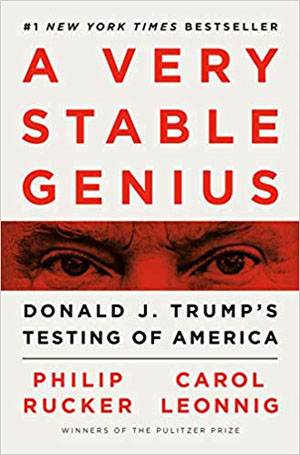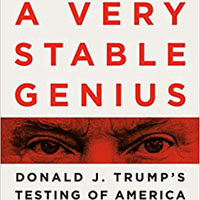— Book review by Jens Kruse —

Philip Rucker and Carol Leonnig, Pulitzer Prize winning
journalists at the Washington Post, have written an important book about the three plus years between Trump’s acceptance of the Republican nomination in July of 2016 and the opening of the impeachment inquiry.
At the end of their “Prologue” Leonnig and Rucker write:
What follows is a chronological account of Trump’s vainglorious pursuit of power in his first term, one that seeks to make meaning by finding patterns in the seeming chaos. There are rages and frenzies but also moments of courage and perseverance. The narrative is intended to reveal Trump at his most unvarnished and expose how decision making in his administration has been driven by one man’s self-centered and unthinking logic – but a logic nonetheless. This is the story of how Trump and his advisers have scrambled to survive and tested the strength of American democracy and its common heart as a nation. (8)
The “Epilogue” of their book begins with July 25, 2019, the date on which Trump places the call to the new president of Ukraine that will trigger the impeachment inquiry against him.
In between, in five sections of five chapters each, the authors unspool the narrative referred to above. To give a flavor of those chapters I will cite one chapter title from each section: “Paranoia and Pandemonium;” “Impeding Justice;” “Congratulating Putin;” “Hand Grenade Diplomacy;” “Loyalty and Truth.”
Rucker’s and Leonnig’s account is “based on hundreds of hours of interviews with more than two hundred sources, including Trump administration officials, friends, and outside advisers to the president, as well as other witnesses to the events described herein (xi).” The narrative traces events that anyone who has followed news reporting during the last three years will find somewhat familiar, but many of the episodes of this book provide detail and granularity that is new and confront the reader with a mixture of drama, comedy, tragedy and farce.
There is the moment when Trump is asked to read aloud a passage from the constitution for a documentary and struggles with that task and complains that the constitution is “like a foreign language” (41).
There is the scene when Trump meets with highly decorated officers and soldiers at the Pentagon, becomes exasperated with them and calls them “a bunch of dopes and babies” (136).
There is the time he meets with Prime Minister Modi of India who expresses concerns about China and Trump responds: “It’s not like you’ve got China on your border” (163).
There are repeated accounts of Trump’s impatience with briefings, in part because he is convinced that “I know better than anybody else” (165).
There is the time that Trump visits the USS Arizona Memorial in Pearl Harbor and asks his chief of staff Kelly: “Hey, John, what’s this all about? What’s this a tour of?” (169)
There is the time that Trump asks his then Secretary of State Rex Tillerson to “get rid of the Foreign Corrupt Practices Act” (170) so that American companies can pay bribes to get business abroad.
There is the time that Trump asks his Secretary of Homeland Security, Kirstjen Nielsen, to “just do it” (306) even though he is told that it would be against the law.
As Leonnig’s and Ruckers narrative progresses, one clear take- away is that Trump becomes more and more unchecked by institutions, protocols, advisers, and laws. They write:
Trump began the year 2019 as a president unchained. He had replaced a raft of seasoned advisers who sought to enlighten and restrain him with a cast of enablers who executed his orders and engaged his obsessions. Jim Mattis was replaced by Patrick Shanahan. Don McGahn was replaced by Pat Cippolone. Jeff Sessions was replaced by Bill Barr. John Kelly was replaced by Mick Mulvaney. They saw their mission as telling the president yes. (355)
Towards the end of their epilogue, they summarize:
The Ukraine episode revealed some essential and worrisome truths about Trump, two and a half years into his term. He was a president entirely unrestrained, free from the shackles of seasoned advisers who sought to teach him to put duty to country above self and to follow protocols. He had concluded he was above the law, after dodging accountability for flouting rules and withstanding the Mueller investigation. He had grown so confident of his own power, so cocksure that Republicans in Congress would never dare break with him, that he thought he could do almost anything. The result was a historic test for America’s institutions and the very durability of its democracy. (414)
And remember the authors come to this assessment prior to Trump’s acquittal in the Senate. It is very likely that when the paperback edition of this book is published Rucker and Leonnig will have to include an “Afterword” that will intensify the alarm of that conclusion.
A Very Stable Genius. Donald J. Trump’s Testing of America (New York: Penguin Press, 2020) can be checked out from the Orcas Library. It is available through Darvill’s Bookstore.
**If you are reading theOrcasonian for free, thank your fellow islanders. If you would like to support theOrcasonian CLICK HERE to set your modestly-priced, voluntary subscription. Otherwise, no worries; we’re happy to share with you.**









I don’t blame Trump. A dictator is gonna’ do what a dictator does. It is the complicit Republicans that I do not understand. At this point, I think they are all guilty of treason, except for Romney. I never believed in term limits but if politicians were limited to two terms, period, there would be no incentive for becoming collaborators because the overwhelming desire for re-election, even at the cost of our country, would be gone.
The Republican “Party” has ceased being a political party. It has become the Cult of Trump. Chanting “Four More Years” at his State of the “Union” address was clear evidence of this obvious fact.
One reality of the bully’s ethos is that there is a very finely calculated appraisal of privilege that obliges one to tell obvious lies, enact obvious buffoonery, and break social norms, just to lay claim to the power of that privilege.
He can’t actually “stand in the middle of 5th Avenue and shoot somebody,” but he can con us into fearing it might be so and have us chasing our tails “revealing” just how awful he really is.
But as with every bully, it is not the acts of the few, but the consent of the many that conjures him forth. The Right gets their justices while saying “Well. We’re aaaalll sinners.” True enough. The Left gets their liberal enlightenment bias, and he gets to evade the entire fourth estate as “fake news.” Hunter Biden rides the crest of privilege granted by our democratic “royalty” and he gets to play at “corruption,” making a mockery of Congress. He divides us as cultural warriors, just as Bush’s “Turd Blossom” did. But George was again, democratic royalty and unimpeachable.
So we get to vote on it and see just how many are complicit. It may be our immigrants and brown people that save our Democracy, with an even 45% of the electorate, while the rest of us send up a balloon from our fortress in the culture wars and natter on about the latest rule that bad man just broke. Nothing we say against the man has resonance because of our own prior complicity.
“It is for us the living, rather, to be dedicated here to the unfinished work..” -A.L. 1863. We just have to believe in it.